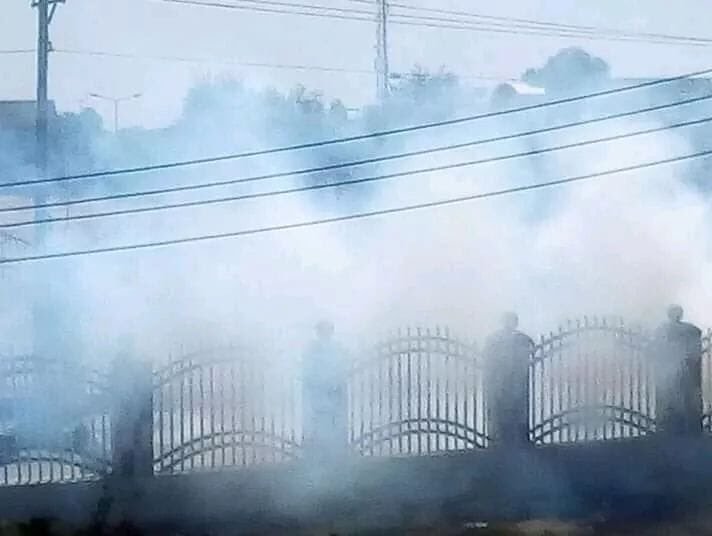Tear Gas as a Chemical Weapon: When is it prohibited under international law? The question of Sudan at present
Eric Reeves | January 24, 2019 | https://wp.me/p45rOG-2mV
Any survey of the use of tear gas—one form of what is called an “Incapacitating Chemical Agent” (ICA)—quickly reveals a number of controversies about how the Chemical Weapons Convention (CWC) applies to the use of the gas in domestic law enforcement. Tear gas is clearly banned in military use, but the matter becomes more complicated since (perversely in my view) the CWC, by nearly all accounts, continues to permit use for domestic law enforcement.
I offer here three excerpts from longer documents, but which seem to push toward a clear conclusion, insofar as international law can be brought to bear on the domestic law enforcement use of tear gas or other ICAs (some of which have been in evidence in actions by the security forces of the regime in Khartoum, Sudan). The first comes from the International Committee of the Red Cross:
• The International Committee of the Red Cross | https://www.icrc.org/en/doc/resources/documents/interview/2013/02-06-toxic-chemical-weapons-law.htm
“For law enforcement purposes, the use of riot control agents – i.e., ‘tear gas’ – is permitted. In the view of the ICRC, the Chemical Weapons Convention, the Biological and Toxin Weapons Convention, international human rights law, and international drug control law form an overlapping international legal framework that leaves little room, if any, for the legitimate use of toxic chemicals other than riot control agents as weapons for law enforcement.”
The upshot of the ICRC analysis is that tear gas can be used only as a “riot control agent.” But what we have seen in Sudan are not riots but peaceful demonstrations, turned violent by the actions of the al-Bashir regime’s security forces. They are not controlling riots, but rather deliberately sabotaging the efforts of people peacefully to demand freedom, peace, and justice—ER
• The second excerpt comes from the International Law and Policy Institute: “Chemical weapons and law enforcement under international law” | http://nwp.ilpi.org/?p=5667
“Are there any restrictions on using Incapacitating Chemical Agents (ICA) in law?”
“The Chemical Weapons Convention does not explicitly allow ICAs to be used in law enforcement (it does not even mention ICAs), but the most logical reading of the Convention is that it also does not explicitly prohibit such use. The Convention does, however, limit use to “the types and quantities [that] areconsistent with such purposes.” (Article II.2, Chemical Weapons Convention).”
I would argue that particularly the quantities of tear gas, as used by Khartoum’s security forces, are grossly inconsistent with any reasonable law enforcement purposes, and thus violate Article II.2 of the Chemical Weapons Convention—ER
Finally, it is important to under that international human rights law (IHRL) extends to a “broad range of circumstances where the use of ICA weapons or RCAs might be considered.” Thus the Khartoum regime’s excessive use of tear gas for purposes that have nothing to do with law enforcement—and everything to do with suppressing lawful demonstrations—comes within the ambit of IHRL:
• “Human Rights Law Applicable to ICA Weapons and Riot Control Agents” | https://link.springer.com/chapter/10.1057%2F9781137467140_8 | Global Issues Series (GLOISS) | https://link.springer.com/bookseries/15012
Michael Crowley (author)
“Although human rights law does not specifically address the use of discrete arms or security equipment, it is certainly of great relevance to the employment of such weapons, as it regulates the use of force by law enforcement officials and other agents of the State. An important strength of international human rights law (IHRL) is its applicability in a broad range of circumstances where use of ICA weapons or RCAs might be considered. The International Court of Justice has affirmed that human rights law continues to apply in situations to which IHL is applicable, whilst the UN Human Rights Committee has stated that, in situations of armed conflict, “both spheres of law are complementary, not mutually exclusive.
“Thus, IHRL would be applicable to domestic policing operations, to non-international conflicts, whether or not the State recognized it as such, and to those aspects of an international conflict occurring in national territory. The importance of this breadth of coverage has been highlighted by Hampson, who has noted that ‘States frequently refuse to characterize an internal armed conflict as such, preferring to call it criminal or terrorist activity. In such a situation, they can hardly challenge the applicability of human rights law.’”
Al-Bashir regime’s assault on Omdurman Hospital clearly violated International Human Rights Law in its massive and potentially deadly overuse of tear gas
